
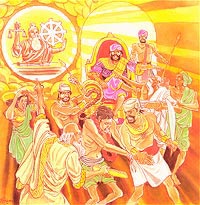
Verse 256. The Just And The Impartial Judge Best
Whoever judges hastily
does Dhamma not uphold,
a wise one should investigate
truth and untruth both.
Explanation: If for some reason someone were to judge what is right or wrong, arbitrarily, that judgment is not established on righteousness. But, the wise person judges what is right and what is wrong discriminately, without prejudice.
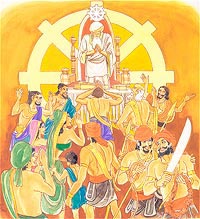
Verse 257. Firmly Rooted In The Law
Who others guides impartially
with carefulness, with Dhamma,
that wise one Dhamma guards,
a ‘Dhamma-holder’s’ called.
Explanation: That wise person, who dispenses justice and judges others, impartially, without bias, non-arbitrarily, is guarded by and is in accordance with the Law of Righteousness. Such a person is described as well established in the Dhamma.
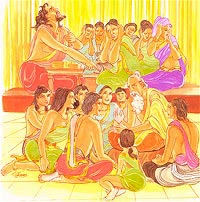
Verse 258. Who Speaks A Lot Is Not Necessarily Wise
Just because articulate
one’s not thereby wise,
hateless, fearless and secure,
a ‘wise one’ thus is called.
Explanation: A person cannot be described as learned simply because he speaks quite a lot. He who is liberated and secure, non-hating and fearless is described as a learned person.
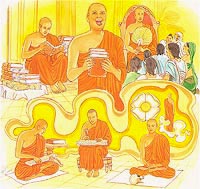
Verse 259. Those Who Know Speak Little
Just because articulate
one’s not skilled in Dhamma;
but one who’s heard even little
and Dhamma in the body sees,
that one is skilled indeed,
not heedless of the Dhamma.
Explanation: One does not become an upholder of the Law of Righteousness merely because one talks quite a lot. Even if one, though he has heard only a little, experiences the Dhamma by his body and is diligent, he is the true upholder of the Dhamma.
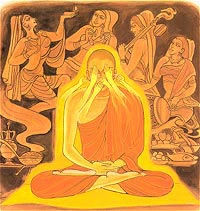
Verse 260. Grey Hair Alone Does Not Make An Elder
A man is not an Elder
though his head be grey,
he’s just fully ripe in years,
‘aged-in-vain’ he’s called.
Explanation: One does not become an elder merely because one’s hair has turned grey. One, who is only old in years, has grown ripe uselessly.
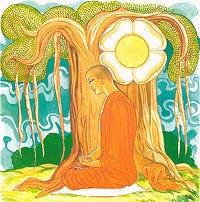
Verse 261. The Person Full Of Effort Is The True Elder
In whom is truth and Dhamma too,
harmlessness, restraint, control,
he’s steadfast, rid of blemishes,
an ‘Elder’ he is called.
Explanation: All things that men do arise out of the mind. The words and deeds of men spring from their minds. Sometimes, their mind are blemished – evil. If they speak or act with an evil mind, the inevitable result is suffering. Wherever they go, this suffering will follow them. They cannot shake off this suffering. This is very much like the wheel of the cart that follows the steps of a draught bull yoked to the cart. The bull is perpetually bound to it.
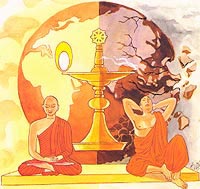
Verse 262. Who Gives Up Jealousy Is Good-Natured
Not by eloquence alone
or by lovely countenance
is a person beautiful
if jealous, boastful, mean.
Explanation: Merely because of one’s verbal flourishes, impressive style of speaking, or the charming presence, a person who is greedy, envious and deceitful, does not become an acceptable individual.
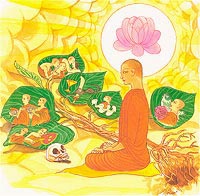
Verse 263. Who Uproots Evil Is The Virtuous One
But ‘beautiful’ is called that one
in whom these are completely shed,
uprooted, utterly destroyed,
a wise one purged of hate.
Explanation: If an individual has uprooted and eradicated all these evils and has got rid of blemishes, such a person is truly an acceptable person.
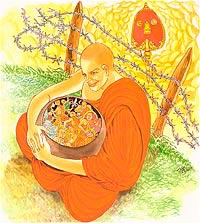
Verse 264. Shaven Head Alone Does Not Make A Monk
By shave head no samana
if with deceit, no discipline.
Engrossed in greed and selfishness
how shall he be a samana?
Explanation: Can an individual who does not practice religion, speaks untruth, and is filled with desire and greed, become an ascetic, merely because he is shaven-headed?
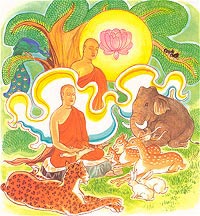
Verse 265. Who Give Up Evil Is True Monk
All evils altogether he
subdues both fine and gross.
Having subdued al evil he
indeed is called a ‘Samana’.
Explanation: If an individual were to quell all defilements, big and small, he is described as an ascetic – a samana.
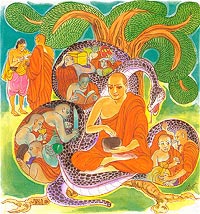
Verse 266. One Is Not A Monk Merely By Begging Alms Food
Though one begs from others
by this alone’s no bhikkhu.
Not just by this a bhikkhu
but from all Dhamma doing.
Explanation: No one becomes a monk merely because he begs others. An individual, though begging , does not become a monk if he embraces vicious and repulsive beliefs.
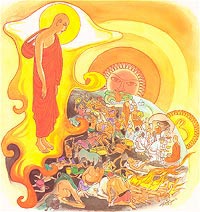
Verse 267. The Holy Life Makes a Monk
Who both good and evil deeds
has gone beyond with holy life,
having discerned the world he fares
and ‘Bhikkhu’ he is called.
Explanation: Who rises above both good and evil and treads the path of higher discipline, reflecting wisely , that person, indeed, deserves to be described as a monk.
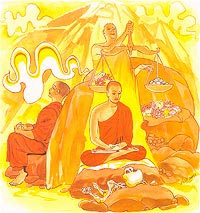
Verse 268. Silence Alone Does Not Make A Sage
By silence one is not a sage
if confused and foolish,
but one who’s wise, as if with scales
weighs, adopts what’s good.
Explanation: The ignorant person, possessing foolish ways and seemingly bewildered, may practice silence – the austerities of the munis. But this does not make him a sage. But the wise person, like someone holding scales, weighs good and bad and selects what is noble.
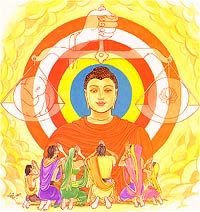
Verse 269. Only True Wisdom Makes a Sage
Shunning evil utterly
one is a sage, by that a sage.
Whoever both worlds knows
for that one’s called a ‘Sage’.
Explanation: Weighing what is right and wrong, he shuns evil. For he is a sage (muni). He is capable of weighing both worlds through his sagely wisdom.
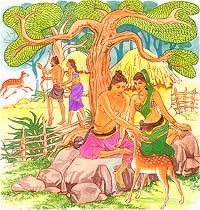
Verse 270. True Ariyas Are Harmless
By harming living beings
one is not a ‘Noble’ man,
by lack of harm to all that live
one is called a ‘Noble One’.
Explanation: A person who hurts living beings is not a noble human being. The wise person, who does not hurt any living being is called ariya, a noble individual.
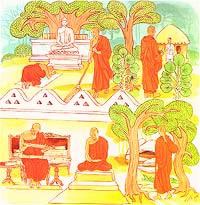
Verse 271. A Monk Should Destroy All Passions
Not by vows and rituals
or again by learning much
or by meditative calm
or by life in solitude.
Explanation: These two stanzas are an admonition to the monks making an effort to reach the state of blemishlessness – Nibbana. They are asked not to slacken their effort to win liberation by being content with some achievement which only pave the way to the final goal.
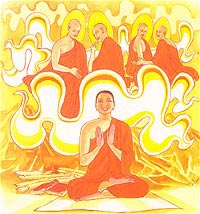
Verse 272. Blemishes Should Be Given Up To Reach Release
Should you, O bhikkhu, be content,
“I’ve touched the bliss of letting go
not enjoyed by common folk”,
though you’ve not gained pollution’s end.
Explanation: Monks, do not rest content by precepts and rites. Do not be content with extensive learning, Nor should you feel satisfied by achieving states of mental trance. Do not rest content with seclusion, assuring yourself “I have experienced the joy of renunciation not possible for the ordinary.” Do not slacken your effort until you have attained Nibbana.

